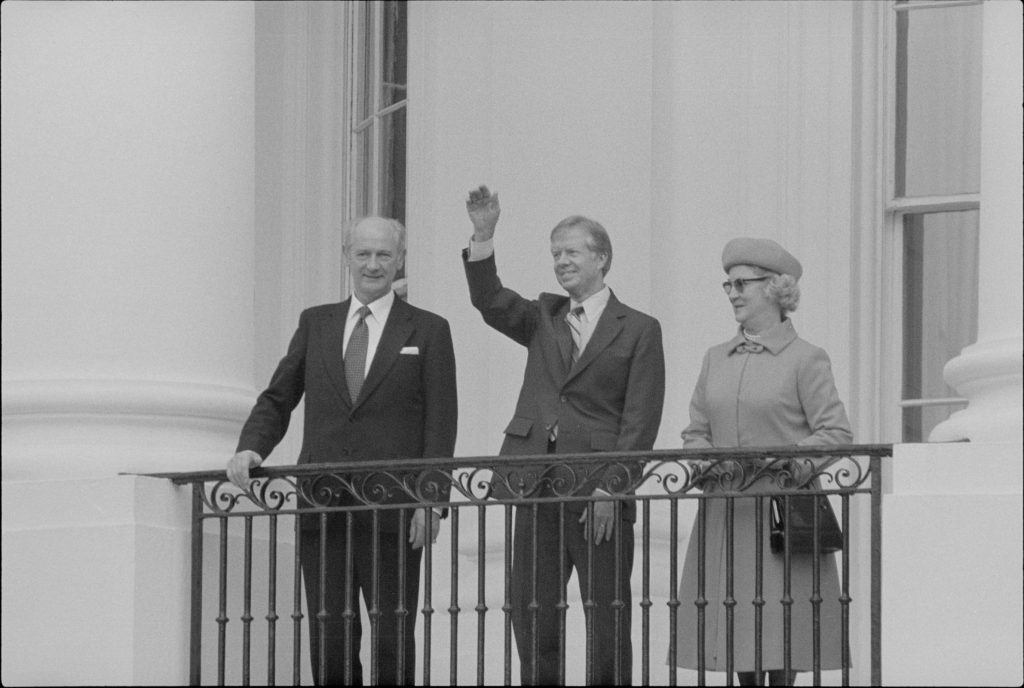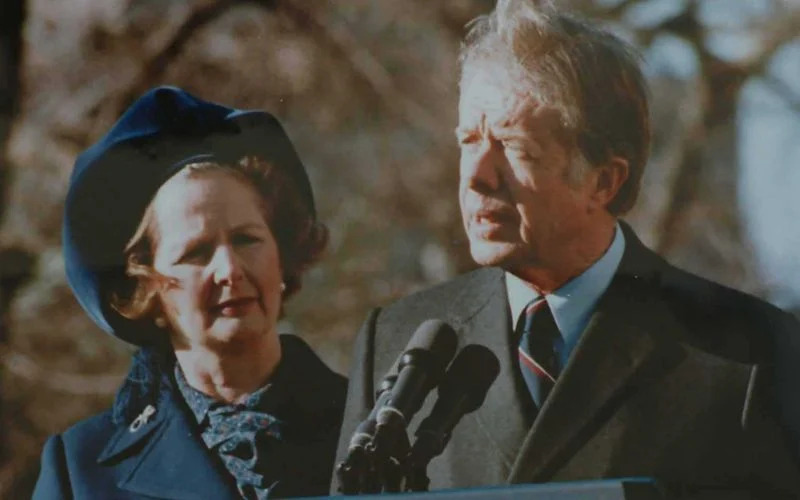Jimmy Carter’s involvement in Northern Ireland affairs was far more substantial than many Irish Americans may think.
Former President Jimmy Carter, who has died at the age of 100, is remembered for his impact on foreign policy and his humanitarian work after his presidency. He was also very much interested in finding a peaceful solution to the Troubles in Northern Ireland.
We look back to 1979 when Carter was at the heart of a decision to ban U.S. arms shipments to the hated Royal Ulster Constabulary (RUC) police force, an attitude that infuriated Margaret Thatcher, who had just come into power. Strong Irish American lobbying led by the Irish National Caucus leader Father Sean McManus originally secured the ban.
According to Irish and British diplomatic papers, Thatcher insisted that London should “no longer turn the other cheek” when faced with US criticism of Britain’s role in Northern Ireland, as the issue strained the allies’ “special relationship.”
The 1979 papers show that “Anglo-American relations came under pressure after the US government decided in July that year to withhold export licenses for the supply of arms to the Royal Ulster Constabulary.”
The British government had ordered 3,000 .375 Magnum handguns and 500 .223 semi-automatic rifles from the Sturm Ruger Corporation of Connecticut.
Thatcher went to Washington on December 17, 1979, to push for the ban to be lifted.
According to the Financial Times, Thatcher, the newly elected prime minister, remarked in a private meeting that it should be “brought home to the Americans that for so long as they continued to finance terrorism, American lives as well as those of others would be lost.”
The Times continues: “The relationship between Mr. Carter and Mrs. Thatcher became frayed over the issue, with the British leader schooling the US president on the conflict after he admitted not knowing much about the situation in Northern Ireland.”
Ms. Thatcher sent four papers detailing UK policy. In a letter, she told Carter: “It is an unhappy fact that perspectives on Ireland – and not only in the United States – are still apt to owe more to the 19th century than to the facts of the present-day world.”
The minutes of her initial meeting with the president revealed that she “handled both the gun which the RUC at present used and that US model which was on order. There was no doubt that the American Ruger was much better.”
President Carter said during the same meeting that he “would like to approve the sale but did not wish to be defeated in Congress or to have a major altercation with them.”
Irish state documents, released under the 30-year rule, revealed that subsequently, Carter urged U.S. speaker Tip O’Neill to lift the ban on arms sales to the RUC at the request of Thatcher.
According to Irish government papers, the exchange was the first substantive one ever between a U.S. president and a British leader.
Speaker O’Neill refused and said any arms deals from the US to the RUC would benefit the IRA, whose supporters would be outraged by the American move.
Note: On the anniversary of the Good Friday Agreement in 2023, Irish Taoiseach Micheál Martin wrote in an opinion piece that ran in the Atlanta Journal-Constitution that Carter’s early work helped end the Northern Ireland conflict: “A 1977 initiative by the former president helped set the stage for the Good Friday Agreement of 25 years ago”..read on.

End Note: Mutual of America’s Commitment to Human Rights
When we think of Bill Flynn, the late Chairman of Mutual of America, we tend to think of him and his role in the Northern Ireland Peace Process. Indeed, way back before Sen. George Mitchell chaired the talks that led to the signing of the Good Friday Agreement, Mutual had sponsored a conflict /resolution conference in Derry. The insurance company also has a long history of supporting non-profit organizations in the U.S., including the Boy and Girl Scouts of America and the Carter Center. But back to Flynn’s role in the peace process and a glimpse at his behind-the-scenes outreach.
I interviewed Gerry Adams, who appeared in the April 1991 issue of Irish America. Mr. Flynn invited me to lunch to fill him in on the background of that interview and get my opinion of Adams. He asked if I thought he was sincere about Sinn Féin being interested in a way forward through all-party talks. I said yes, that I thought he was, and that it would be a good idea for Flynn to meet Adams.
While chatting, Mr. Flynn received a call at the restaurant telling him that former President Carter was on his way to the Mutual office. He invited me back to meet with the former U.S. President.
At the hastily gathered meeting of Mutual’s top executives in the company’s board room, I remember that the subject of Northern Ireland came up, and Carter said that his Center was researching, gathering information, and looking at possible solutions. So, as we remember President Carter and his Human Rights work, let’s also remember Mutual of America, Bill Flynn, Tom Moran, Ed Kenny, and the many on this side of the ocean, including Irish America’s publisher Niall O’Dowd, who helped move the peace process forward. – Patricia Harty



I have always known that Thatcher was a war monger, but it is interesting to learn that she threatened American lives so England could control Northern Ireland.